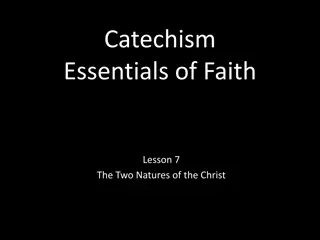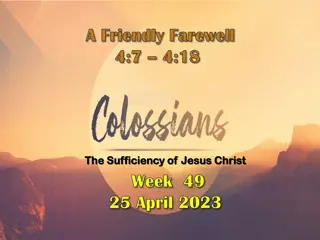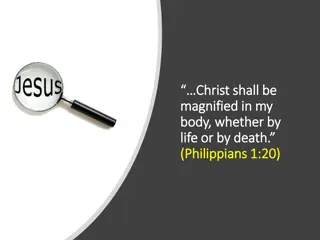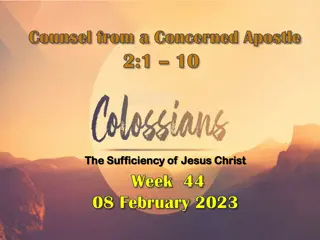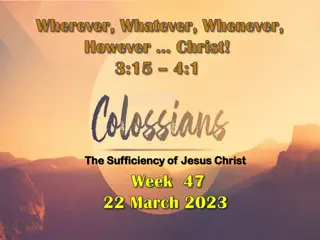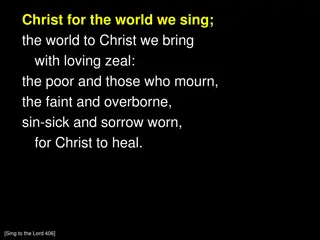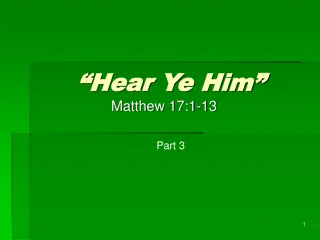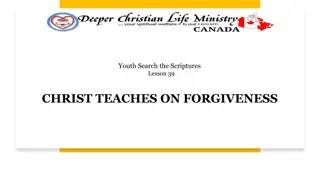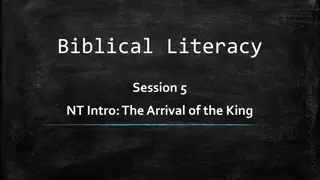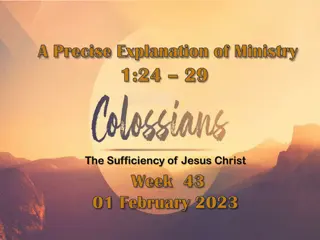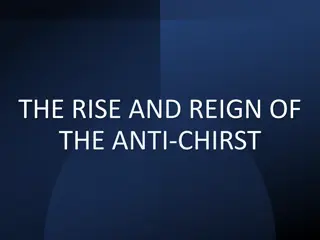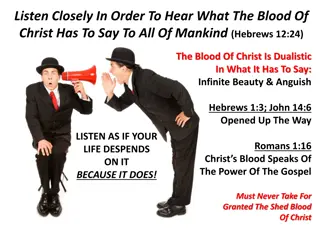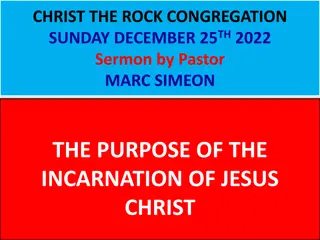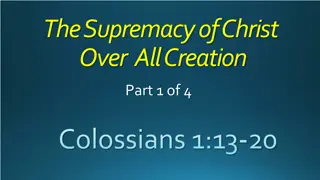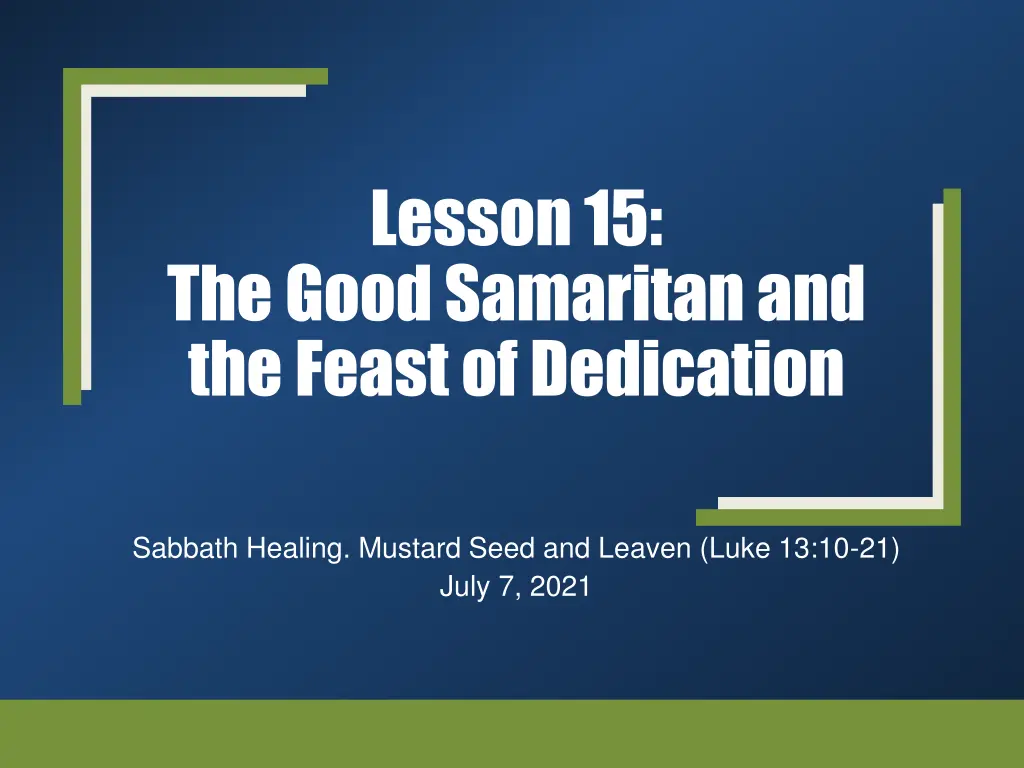
Sabbath Healing Miracle in Luke 13:10-17
Explore the profound Sabbath healing miracle in Luke 13:10-17 where Jesus demonstrates compassion and power, despite facing resistance. Witness the woman's immediate healing and the ruler of the synagogue's reaction, revealing contrasting responses to Jesus' miraculous work.
Download Presentation

Please find below an Image/Link to download the presentation.
The content on the website is provided AS IS for your information and personal use only. It may not be sold, licensed, or shared on other websites without obtaining consent from the author. If you encounter any issues during the download, it is possible that the publisher has removed the file from their server.
You are allowed to download the files provided on this website for personal or commercial use, subject to the condition that they are used lawfully. All files are the property of their respective owners.
The content on the website is provided AS IS for your information and personal use only. It may not be sold, licensed, or shared on other websites without obtaining consent from the author.
E N D
Presentation Transcript
Lesson 15: The Good Samaritan and the Feast of Dedication Sabbath Healing. Mustard Seed and Leaven (Luke 13:10-21) July 7, 2021
Sabbath Healing.(Luke 13:10-17) The Day: Luke 13:10, And he was teaching in one of the synagogues on the sabbath day. Only Luke records this miracle. It was Jesus habit to teach in the synagogues (Matthew 4:23; 9:35; Luke 4:15, 44; et. al). This is the last recorded occurrence in which Jesus taught in a synagogue. The Woman: Luke 13:11, And behold, a woman that had a spirit of infirmity eighteen years; and she was bowed together, and could in no wise lift herself up. This was produced by Satan. Luke 13:16; cf. 11:14
Sabbath Healing.(Luke 13:10-17) The Miracle: Luke 13:12-13, And when Jesus saw her, he called her, and said to her, Woman, thou art loosed from thine infirmity. And he laid his hands upon her: and immediately she was made straight, and glorified God. There is not evidence that the woman (or anyone) came with any intention of being healed. She was made straight She was restored or strengthened (see anorthoo in Acts 15:16 and Hebrews 12:12). Immediately Luke stresses the immediacy of results in the miracles of Jesus (1:64; 4:39; 5:25; 8:44, 47; 8:55; 18:43). She glorified God. Praising and thanking Him as had others who had been blessed by Jesus presence, His words, and His power (Luke 2:20; 4:15; 5:25-26; 7:16; etc.)
Sabbath Healing.(Luke 13:10-17) The Ruler Of The Synagogue. cf. Mark 5:22 Luke 13:14, And the ruler of the synagogue, being moved with indignation because Jesus had healed on the sabbath, answered and said to the multitude, There are six days in which men ought to work: in them therefore come and be healed, and not on the day of the sabbath. The Ruler was in charge of maintaining orderly religious services. The ruler answered with indignation, he was angry at Jesus. Too cowardly to openly rebuke Jesus, the ruler fell to reprimanding the people, and thus indirectly censuring the Lord. If he had reasoned right, he would have seen that he who could perform such a miracle could not be a violator of the law of God. (cf. John 5:36ff; Hebrews 2:4)
Sabbath Healing.(Luke 13:10-17) The Ruler Of The Synagogue. Luke 13:14, And the ruler of the synagogue, being moved with indignation because Jesus had healed on the sabbath, answered and said to the multitude, There are six days in which men ought to work: in them therefore come and be healed, and not on the day of the sabbath. In contrast to the proper response which the woman evidenced, she glorified God
Sabbath Healing.(Luke 13:10-17) The synagogue ruler was indignant because Jesus had not followed the Law as that ruler interpreted it. He appealed to the crowd to reject Jesus' miracle. This attitude supports what Jesus had already said about religious leaders keeping others from entering the kingdom (Luke 11:52; cf. John 12:10). NOTE: Luke does not indicate that any of the people, including the woman, had come for the purpose of being healed. However, the ruler implied that they had or might do so in the future.
Sabbath Healing.(Luke 13:10-17) The Lord s Answer: Luke 13:15-16, But the Lord answered him, and said, Ye hypocrites, doth not each one of you on the sabbath loose his ox or his ass from the stall, and lead him away to watering? And ought not this woman, being a daughter of Abraham, whom Satan had bound, lo, (these) eighteen years, to have been loosed from this bond on the day of the sabbath?
Sabbath Healing.(Luke 13:10-17) NOTE: Their hypocrisy appears in two ways: 1. They were disguising their hatred toward Christ under a pretended zeal for the Sabbath. 2. Their zeal for the Sabbath was at no time sincere, for they favored indulgence where their own interests were involved, but applied their Sabbath rules sharply where others were concerned. It was their tradition and not the Sabbath which Jesus had broken. Jesus explains the true meaning of the Sabbath. (Exodus 20:8-11; Deuteronomy 5:12-15). Jews had developed 39 categories of the Sabbath.
Sabbath Healing.(Luke 13:10-17) The Lord s Answer: Luke 13:15-16, But the Lord answered him, and said, Ye hypocrites, doth not each one of you on the sabbath loose his ox or his ass from the stall, and lead him away to watering? And ought not this woman, being a daughter of Abraham, whom Satan had bound, lo, (these) eighteen years, to have been loosed from this bond on the day of the sabbath? Evil is the result of an intruding power contrary to God s goodness and desire. In attributing the infirmity to Satan he acknowledges the action of the demon as Satan s agent. Diseases were not infrequently ascribed to Satan and the demons. Acts 10:38; 2 Corinthians 12:7
Sabbath Healing.(Luke 13:10-17) The Lord s Answer: Luke 13:15-16, But the Lord answered him, and said, Ye hypocrites, doth not each one of you on the sabbath loose his ox or his ass from the stall, and lead him away to watering? And ought not this woman, being a daughter of Abraham, whom Satan had bound, lo, (these) eighteen years, to have been loosed from this bond on the day of the sabbath? Acts of compassion were formally recognized by the Mishna as permissible (m. Sab. 5:1-4). NOTE: There was no answer! they could not answer Him regarding these things Luke 14:1-6; (cf. Matthew 12:9-14 concerning the care of sheep).
Sabbath Healing.(Luke 13:10-17) The Response: Luke 13:17, And as he said these things, 1. all his adversaries (opponents NASB) were put to shame: and 2. all the multitude rejoiced for all the glorious things that were done by him. In that wisdom which silenced the narrow- minded rulers. The triumph which they rejoiced in was but a slight foretaste of the victories to come, and to point out the nature of those victories the Lord spoke the two parables which follow. (McGarvey)
The Kingdom Is Like A Grain of Mustard Seed (Luke 13:18-19) Luke 13:18-19, He said therefore, Unto what is the kingdom of God like? and whereunto shall I liken it? It is like unto a grain of mustard seed, which a man took, and cast into his own garden; and it grew, and became a tree; and the birds of the heaven lodged in the branches thereof. These verses are identified clearly as a parable by Matthew (13:31). That writer refers to the rule of God as the kingdom of heaven (13:31). Mark, in an earlier use of this example when Jesus was in Galilee, reports that the mustard seed when it is sown on the ground, is smaller than all the seeds on earth; but when it is sown, it grows up and becomes greater than all herbs, and shoots out large branches (Mark 4:30- 32; Matt. 13:32). The mustard tree (or bush) grew to about ten feet in height. C.G. Caldwell, Luke, Truth Commentaries, page 775
The Kingdom Is Like Leaven (Luke 13:20-21) Luke 13:20-21, And again he said, Whereunto shall I liken the kingdom of God? It is like unto leaven, which a woman took and hid in three measures of meal, till it was all leavened. This illustration is also repeated from an earlier incident recorded in Matthew 13:33. A little leaven leavens the whole lump (1 Corinthians 5:6; Galatians 5:9).
The Kingdom Is Like Leaven (Luke 13:20-21) Three measures was a very large amount (almost fifty pounds) of flour. Abraham asked Sarah to make cakes from three measures of fine meal when God s three messengers came to his tent (Genesis 18:6). A little leaven could spread through a large amount of new dough overnight. This is how he kingdom would grow. This is also how the hypocrisy of the Jews would spread.
The Feast Of Dedication (John 10:22-42) 10:22-26 The feast of the dedication. In John 7 we read of the feast of Tabernacles. We noted that the feast of Tabernacles was six months before the death of Jesus. Jesus death occurred at the end of the Passover. The feast of dedication occurred a little over two months after the feast of Tabernacles (Booths). That would make this text about three and a half months before Jesus death. The feast of dedication was a commemoration of the purification and rededication of the temple after the Syrians, under Antiochus Epiphanes, had desecrated it in 168 BC. He had offered swine upon the alter. This feast (originated in 165 BC by Judas Maccabaeus) was a very patriotic week for the Jews.



